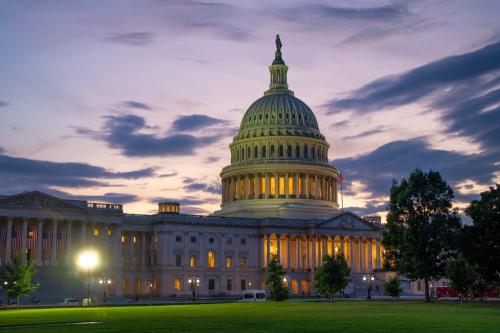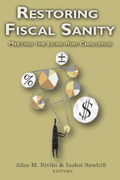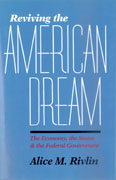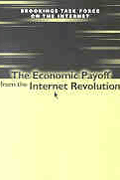Alice Rivlin delivered the following keynote address at the 9th annual meeting of OECD Parliamentary Budget Officials and Independent Fiscal Institutions on April 6, 2017 in Edinburgh, Scotland.
I am grateful to Lady Susan Rice for her gracious introduction and to the Scottish Parliament for its warm welcome to Edinburgh. I am delighted to be here and to share a few thoughts this morning about how budget officials and independent fiscal institutions can provide information and analysis that will help elected legislatures make sound public policy.
Forty-two years ago, when I was asked by the Congress of the United States to start the Congressional Budget Office (CBO), there were hardly any examples of legislative fiscal or budget offices. The law that established the CBO contained little guidance about how to organize, what kind of staff to hire, or how to be most useful to Congress in fulfilling our mission. So we looked for examples of similar organizations, but only California and a couple of other American states had significant budget offices reporting to their legislatures.
The situation in 2017 is different. A large group of OECD countries (and some developing countries, as well) have legislative budget offices or independent fiscal agencies. They are able to reach out to each other, discuss puzzling technical matters, and share stories about triumphs and defeats. New parliamentary fiscal offices in Scotland and Ireland, for example, have a ready group of mentors eager to offer advice on how to get started, what to do and, perhaps especially, what not to do.
I find this evolution very reassuring. I am proud of the CBO, which has had able leadership over the years and has become a highly respected organization that Congress and the public rely on for budget projections and policy analysis—despite sometimes strident sniper fire from politicians on both right and left. I am not sure how the academic community that teaches and researches American budget policy would get along without the CBO!
I am equally gratified to see all these organizations with similar missions sprouting up and generally thriving under varying conditions in many parts of the world. They are led by impressively well-qualified experts, who are passionately dedicated to fiscal responsibility and producing solid information to help politicians make informed decisions. I am excited to be able to interact with this whole roomful of smart people who care about improving the information and analysis underpinning legislative policy decisions. We must have proved our value to political leaders in our various countries or so many of us would not be gathered here in Edinburgh this morning.
But I also sense that we gather together in part for mutual support and comfort in trying and turbulent times. It has never been easy to provide politicians with objective non-partisan information on budget matters in time to help them with the hard decisions on tight schedules. But it has become much more difficult in recent years. So I would like to share with you this morning some thoughts about the difficulties facing our type of institution, some observations about dealing with uncertainty and insufficient evidence, some reasons why the job of providing independent, objective fiscal analysis to legislators and other politicians is getting so much harder; and a few thoughts about what to do about it. My remarks will draw on the United States experience, but I believe we all face many of the same challenges.
Nobody ever said it was easy to work as a parliamentary budget official or lead an independent fiscal institution. If you wanted a job that would not draw criticism and controversy, you chose the wrong career. These are inherently difficult assignments that require not only technical, analytical skill, but ability to win the confidence of politicians without telling them what they most want to hear. They often want magic solutions when there aren’t any.
Parliaments by definition are full of politicians with widely differing views on what is best for their country. Disagreements are often intense, irrespective of whether the actual difference in views is broad or narrow. Politicians win elections because they believe deeply that their cause is right and that policies they espouse are going to benefit the general welfare. In the face of uncertainty, they feature and genuinely believe the evidence that supports their particular point of view. They believe their policy proposals will be highly effective and not very costly. This is a human trait—psychologists have plenty of evidence that people tend to grab onto evidence that supports what they already believe–but it seems especially true of politicians.
Democracies need politicians dedicated to a variety of different policies and eager to argue their point of view. But elected leaders also need reality checks—competent neutral evaluators of the competing policy claims. They also need brakes on spending, taxing, and borrowing. Left to their own devices, and knowing that they must remain popular with voters to keep their jobs, politicians tend to spend more, tax less, and pass the debt on to future politicians and taxpayers—and they know it. They turn to budget technocrats to help keep themselves honest and responsible.
The CBO was created for reasons peculiar to the United States—reasons having to do with the balance of power between the executive and legislative branches under our Constitution. However, CBO has become increasingly important in recent years for reasons that are common to all advanced countries: the difficulty of making budget decisions that balance the needs of an aging population with opportunities for the young in the face of slower economic growth and rising debts.
However, CBO has become increasingly important in recent years for reasons that are common to all advanced countries: the difficulty of making budget decisions that balance the needs of an aging population with opportunities for the young in the face of slower economic growth and rising debts.
The drafters of our 1789 Constitution were the leaders of a successful revolution against the English crown in which resentment against English taxes played a significant role. The last thing they wanted was a powerful executive taxing them without authorization of their elected representatives. Hence, they wrote into the Constitution a sharp separation of powers between the legislative and executive functions and gave congress, not the president, explicit power to spend, tax, and borrow, subject only to a presidential veto that a supermajority could over-ride.
I stress this history, because I am so often surprised how many observers of American politics—even some in the U.S.—fail to understand how limited American presidential power really is. We make such a spectacle of our presidential elections, and spend so much time and money on the election process, that many observers at home and abroad assume that the American president must have awesome powers. In fact, the American presidency is a fairly weak office, especially with respect to domestic affairs. The president cannot change laws, spend money, increase or lower taxes without engaging in detailed and often arduous negotiations with the independently powerful Senate and House of Representatives (and sometimes with the courts).
One might think that it would be easier for a president to win battles with Congress if his own political party has a majority in both chambers—and sometimes it is—but party loyalty and discipline are not strong features of American democracy, as President Donald Trump is discovering. Despite campaigning vigorously on the promise of repealing and replacing President Obama’s signature health care initiative, the Affordable Care Act, President Trump has so far been unable to get his own Republican party to agree on how to fulfill that promise. Disagreements between right-wing and more moderate Republicans prevented a majority from coalescing around one proposal, even in the House of Representatives, where Republicans have a substantial majority. Even if a compromise passes the House it will face an uncertain future in the Senate, where the Republican majority is narrower and procedural rules give the minority more power.
The CBO was created as a result of President Richard Nixon over-stepping his presidential powers in the early 1970s. Congress reacted by reasserting their control over fiscal matters. They created a new process for making budget decisions, including a Budget Committee in each chamber, and the CBO. This new agency was charged with providing non-partisan, objective budget forecasts and analysis of fiscal alternatives to both the House and the Senate. The president had such an agency, established in 1921 and now called the Office of Management and Budget. Congress wanted a similar agency working for them, but to fit into the congressional context it would have to be non-partisan and responsive to both House and Senate. That meant giving the director of CBO a lot more independence than the director of the Office of Management and Budget, who works directly for the president. I have held both jobs and much preferred CBO.
While the origins of the CBO reflected the idiosyncratic structure of the U.S. Constitution, its growing responsibilities and prominence stem from economic and fiscal pressures that advanced countries share: the need to make responsible fiscal decisions in the face of rising demand for public services and commitments to pensions and health care for aging populations, resistance to higher taxation, and fears about rising debt.
Beginning in the 1980s, the U.S. Congress enacted self-imposed rules to enforce fiscal rectitude—rules designed to hold down annual deficits and keep the national debt from rising faster than the economy was growing. Similar rules appeared in other advanced countries that faced comparable budget challenges. The fiscal rules on deficits and debt in the Maastricht Treaty embodied the same concept—albeit without workable enforcement.
If fiscal rules are to be enforced there has to be a referee or scorekeeper. Someone has to provide an accepted answer to questions like: How will this proposed budget or spending measure or tax change affect the budget deficit and the future debt? It was this scorekeeping role that put CBO in the spotlight, made it necessary for the staff to make estimates of the budget impact of exceedingly complex legislation as it was being considered, and subjected CBO to often strident attack from politicians whose legislative objectives were threatened by the CBO “score.” The scoring role precipitated technocrats with their data sets and statistical models and algorithms into positions of power in the policy decision process. It became normal for the drafters of major tax and spending legislation to consult with CBO during the process of writing the bill, because the CBO score would determine whether or not their legislation conformed to the budget rules. The details of programmatic proposals were often changed in order to achieve an acceptable score. Some politicians and policy advocates complain that CBO has excessive power and that designing the best policy becomes lower priority than getting the right score. CBO, of course, is only trying to do its best to help facilitate enforcement of the fiscal rules that the politicians in congress have imposed on themselves. In carrying out its mission, however, CBO is sometimes perceived as a group of unelected technocrats presuming to prevent the elected representatives of the people from making the laws.
Sometimes the budget rules worked well in the sense that they provided a framework for opposing political forces to resolve their policy differences while containing deficits and debt. Rules adopted in 1990 capped annual appropriations and required that the deficit-increasing effects of tax cuts and benefit increases be offset. These rules helped produce a budget surplus by the end of the decade. Subsequent weakening of the rules had bizarre consequences. In 2001 President Bush proposed tax cuts that were estimated to inflate budget deficits in the long run. So congress designed the tax changes to be deficit neutral over ten years, as the budget rule required, and then to terminate automatically at end of 2010, which then seemed a long time away. But of course 2010 eventually came, and the threat of a big tax increase in a weak economy brought on an artificial budget crisis caused by Congress conforming to the letter, but not the spirit of their own budget rules.
Increasing polarization of our two major political parties has increased the visibility of CBO as scorekeeper. The breakdown of negotiations between President Obama and congressional leadership over measures to contain future debt (called the Grand Bargain) led to a truly crazy budget scenario in 2011. Congress charged a select committee with crafting a Grand Bargain and designed what they thought was an action-forcing mechanism: proportional cuts in domestic and defense spending that neither party thought desirable would come into effect if no Grand Bargain could be reached. The threat failed to produce an agreement. The result has been 6 years of short-run patches to keep the government running while divided political leadership failed to resolve basic differences over the path forward. Partisan rancor has led to gridlock over the eminently soluble question of how to rein in the rising debt—not a good advertisement for representative democracy.
The budget outlook in the United States reflects the same underlying forces familiar to most of the countries represented in this room:
- Commitments to an aging population for retirement income and medical care. In our case, the population is aging less rapidly than most of yours, but we have a peculiarly expensive health care system.
- Slower economic growth which increases the need for higher public as well as private investment in efforts to increase future productivity—science, skills, modernizing infrastructure.
- An out-of-date tax system that cannot be expected—especially in the face of slow growth–to produce sufficient revenue to pay for the costs of maintaining the elderly, provide adequate government services, and finance needed productivity-enhancing investment at the same time.
- This combination of forces leads to projections of a long-run rise in the debt/GDP ratio. U.S. debt held by the public is already high (currently about 78 percent of GDP) largely because of the legacy of the Great Recession that followed the financial crash of 2008, although other factors, such as costs of war in the Middle East, have played a role. CBO projects that debt will rise to about 89 percent of GDP by 2017, as obligations to older people for pensions and health care exceed projected revenues.
To pragmatic centrists like me it seems obvious that political compromises are needed to reverse the rise of debt. The United States needs to restrain the growth of health care costs, modify our commitments to older people, especially those with more than adequate incomes, invest wisely in enhancing future productivity and economic opportunity, and overhaul our tax system so that it produces more revenue in a less growth-inhibiting way. That could mean shifting from heavy reliance on wage and income taxes to more reliance on consumer taxation—adding a VAT, which is an important source of revenue in all OECD countries except for the U.S. A carbon tax is an attractive option, too, but more to discourage the use of fossil fuels than to generate revenue.
However, although this collection of reforms seems compelling to academic centrists like me, who never have to face the voters, it involves compromises that our deeply polarized political leaders are unable to make. Indeed, compromise across party and ideological lines has become a dirty word in American politics. Republicans are stridently opposed to any increases in taxation. Indeed, they favor reducing income tax rates, especially for upper income people. Democrats are just as vociferously opposed to any reductions in benefits to the elderly, poor, or disabled. This stand-off has led to a rejection of sensible centrist plans, several of which I helped write, and years of gridlock in which the only budget actions are short-run measures to keep the government functioning while the basic issues remain unresolved.
The prominence of CBO scoring has turned technical scoring issues into political fights. Even the exceedingly complex issue of how to score government lending and loan guarantee programs has attracted political attention. Two scoring issues in particular have loomed large: (1) How to handle uncertainty in presenting forecasts to policy-makers, especially long run forecasts of spending, revenues, deficits and debt; (2) How to account for the feed-back effects of fiscal proposals on economic performance at the macro level (known as dynamic scoring), which is a special case of the basic question of what constitutes sufficient evidence for policy action.
Uncertainty. The problem with forecasting the future of anything—including the economy and the budget—is that it is impossible to do it accurately, but it is still necessary to make forecasts in order to have a basis for deciding to take actions that will affect the future. Budget forecasts have to start with economic assumptions about GDP growth, employment, inflation, etc. and we all know that macro-economic forecasts are extremely uncertain, especially over the long run or in the face of cataclysmic events like the financial crash of 2008.
Contingent forecasts of spending and revenues, given the macro assumptions and existing laws, are much more accurate, but over time laws change and the cost of implementing the same laws also changes. A clear example is the slow-down in the growth of health spending in the US. It makes a huge difference in projections of future debt whether the slowdown continues or reaccelerates, and views differ sharply on what is likely to happen.
The only thing a sensible forecaster can do in the face of uncertainty is to make the best estimates possible, make the assumptions clear, and give policy makers full information about why the forecasts might be wrong and by how much. CBO has been assiduous in drawing attention to uncertainty—providing ranges, confidence intervals, fan charts, etc. But emphasizing uncertainty is risky. Politicians can easily make acknowledged uncertainty an excuse for fiscal irresponsibility. In the face of uncertainty about future deficits and debt, politicians are often tempted to promise future benefits and tax cuts at the same time. CBO often hears, “You have been wrong before; so why should we believe you now?” The answer isn’t, “This time we are right.” It is, “We could be wrong in either direction.”
Dynamic scoring and adequacy of evidence. Our conservative politicians believe in smaller, less intrusive government, but their most fundamental belief is that cutting taxes, especially corporate and personal income tax rates, will boost economic growth substantially. The evidence is not nearly as strong as they think is, and it obviously makes a difference whether the tax cuts are accompanied by spending cuts that might reduce growth or debt increases that could increase interest rates and discourage investment. CBO has taken a lot of criticism from the right for not adequately recognizing the beneficial effects of lower income tax rates on economic growth, and now similar arguments are being made on the left with respect to the growth-enhancing or deficit-reducing benefits of social spending, such as early childhood education or wellness or prevention programs in health. Advocates of social programs are often more ready than CBO analysts to assume that the positive results of small highly intensive demonstration programs can be replicated at the national level.
Progressives’ criticism of CBOs alleged failure to recognize the future budget savings from social spending is loudly expressed as conservative anger over CBO’s supposed sin of not adequately recognizing the benefits of income tax reduction. Both are special cases of the difficulty of assembling persuasive evidence of effectiveness of policy changes.
While these issues have been debated by social scientists for decades, the good news is that data and analysis are much more sophisticated than they used to be and the potential for evidence-based policy-making is much greater than it was decades ago when I was starting out as a junior policy analyst. But there is bad news, too, which is why I said at the beginning that these were trying times for the people gathered in this room. Parliamentary and Independent fiscal agencies attract people who value rationality, data analysis, econometric models, and evidence-based policy-making. We may have difficulty defining what we mean by truth, but we believe some things are demonstrably true and some are not and that evidence matters.
Now we find ourselves in a world in which evidence is widely disregarded, fake news stories circulate and are widely believed, and politicians (at least some of them) feel entitled to make up their own facts and attack those who question them. Maybe I am over-reacting to our own newly elected President Trump, but I fear he is not unique and that his electoral victory is a symptom of a deeper problem. The title of a later session at this conference speaks of communicating “honest numbers” in a “post-truth” world. I hope that ”post truth” is hyperbole.
The widespread populist reaction against elites and the establishment is not surprising. The governing elites have messed up badly in many of our countries—in failing to avert the financial crisis that devastated so many lives, in tolerating extremes in the distribution of wealth, income, and influence, and failing to take climate change seriously and in failing to intervene in the devastation, natural and man-made, that is impelling millions to risk everything to find refuge in a safer place.
A lot of swirling forces have come together at once.
- Political turmoil and desire for change, polarization of political views and high decibel election campaigns, xenophobia and fear of change.
- Decline of faith in institutions—governments, religious institutions–often for good reasons.
- Explosion of information and social media.
- Falsehoods, fake news, and high tolerance for unverified claims.
Parliamentary and independent budget and fiscal officials are caught in the middle of all this—trying to do their jobs, produce accurate, relevant estimates and projections, and keep their nation’s fiscal house in some semblance of order. The challenges are hardest for newcomers who have not yet established a track record and gained the respect of contending politicians and the public.
So what to do? I see no alternative to continuing to work hard at getting the analysis right and communicating results as comprehensibly and thoroughly as possible, both to elected policy-makers and the public. Politically motivated criticism goes with the job and should be expected. I have faith that providing solidly-based information to elected representatives is still the best formula for good public policy. I am gratified that so many intelligent hardworking people, well-represented in this gathering, are willing to take on the job.
Thank you very much.
The Brookings Institution is committed to quality, independence, and impact.
We are supported by a diverse array of funders. In line with our values and policies, each Brookings publication represents the sole views of its author(s).









Commentary
Coping with change at an independent fiscal institution
April 21, 2017